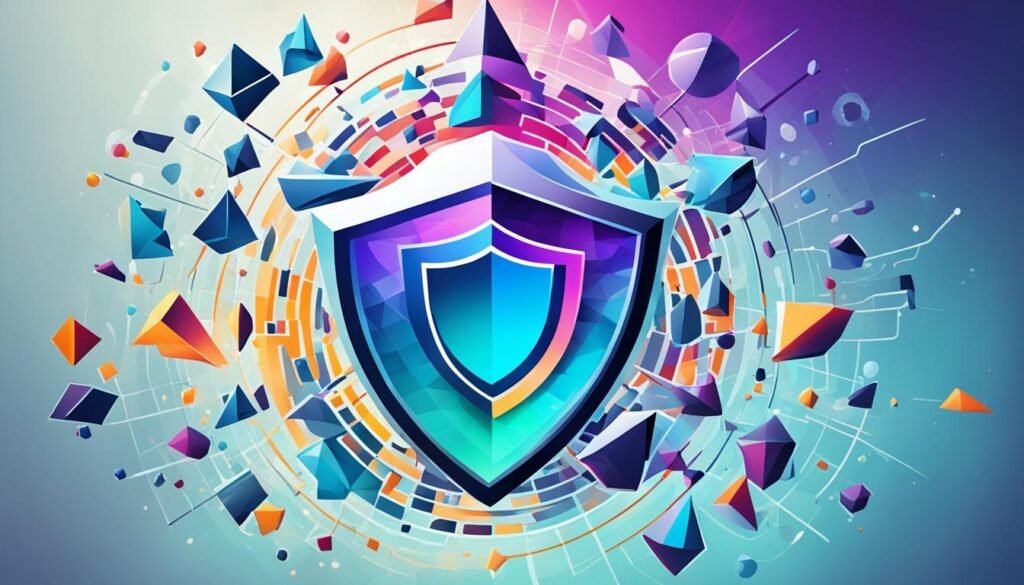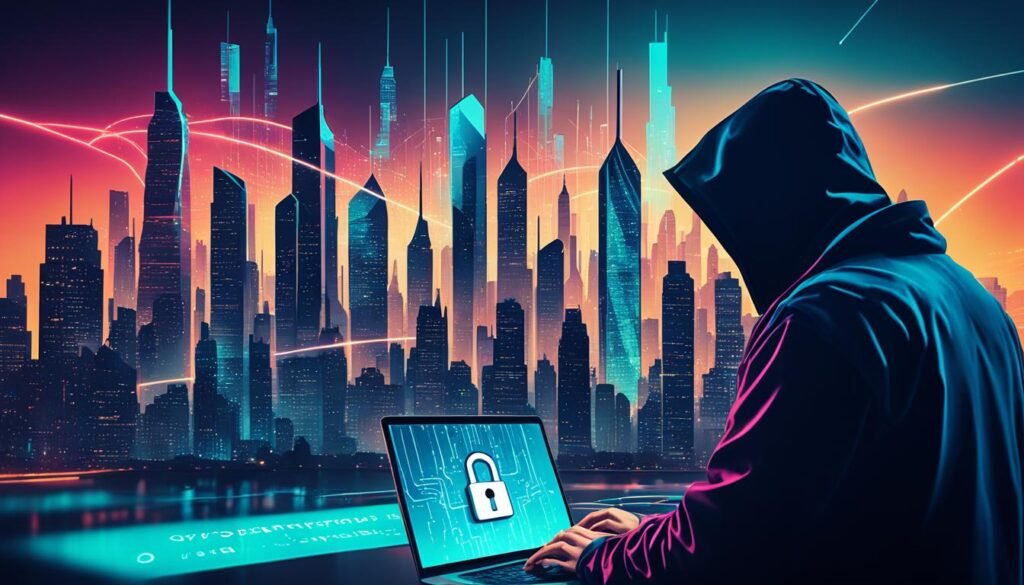Ever wondered how safe your online info is? In today’s world, knowing about virtual private networks (VPNs) is key for keeping your online life private. With more security threats and data leaks, a VPN helps protect your data on the Internet.
A VPN makes a secure, encrypted link over the Internet from your device to a distant network. This encrypted tunnel keeps your private data safe. It’s great for accessing work files or streaming shows from another country without anyone knowing.
VPNs use advanced protocols like OpenVPN, IKEv2/IPSec, and WireGuard. These protocols use strong 256-bit AES encryption. OpenVPN is open-source and trusted for its security.
For Windows users, the SSTP protocol is a good choice. It uses 256-bit encryption and SSL/TSL certifications, fitting well with Windows. People also use VPNs to watch blocked content, access bank accounts from anywhere, or just surf the web safely.
Whether you’re a journalist or just someone who wants to keep your online activities private, a VPN is a must-have. It encrypts your Internet connection, hiding your IP address. This makes you invisible online and keeps your browsing safe.
Introduction to Virtual Private Networks (VPNs)
Virtual Private Networks (VPNs) are now key for keeping internet use safe and private. They started in the 1990s to tackle online privacy and security worries. Now, they’re used for many things, like getting past region blocks and using cybersecurity tools.
VPNs make internet traffic safe by encrypting it, a process called VPN encryption. This keeps your data safe from others as it travels to the internet. They also use network tunneling to make a secure path for all your internet traffic.
More people want to keep their online activities private, so VPNs are getting more popular. They hide your IP address, making it seem like you’re somewhere else. This is great for getting around geo-blocks on streaming sites or accessing websites only in certain areas.
There are many types of VPNs, like Remote Access VPN and Cloud VPN, for different needs. They also come with various VPN protocols, such as OpenVPN and L2TP. Each one has its own level of security and speed, so you can pick the best one for you.
VPNs offer many benefits, like private browsing and safe public Wi-Fi use. But, you should think about speed, server locations, and reviews when picking a VPN. Some countries, like China, limit VPN use for political reasons.
VPNs give you encrypted, private access to the internet. They’re important cybersecurity tools in today’s digital world. They help make the internet safer and more private for everyone, at home and at work.
How VPNs Enhance Online Privacy
VPNs are key to keeping online activities private. They encrypt internet connections and send traffic through secure servers. This adds many layers of protection for remote workers and those using cybersecurity tools.
Anonymous Browsing
Using a VPN means you can browse the web anonymously. It hides your IP address and sends your internet through a secure server. This makes it hard for others to trace your online actions back to you. It helps protect against ISP snooping and data collection.
IP Masking
IP masking is a big part of VPNs that boosts privacy. It changes your IP address to one from the VPN server. This makes websites think you’re accessing content from somewhere else. It helps avoid data interceptors and lets you get past censorship to see restricted content. VPNs encrypt all data, so no one can read it if they try to intercept it.
VPNs also offer strong cybersecurity tools. They use encryption like AES-256 to keep data safe and private. Many VPNs don’t keep logs of what you do online. This is important for keeping your privacy at its highest level.
VPNs also help with secure remote work. They make sure remote workers can safely connect to company networks. With features like multi-factor authentication, only the right people can get to sensitive info.
Understanding VPN Encryption
VPN encryption is key to the security a VPN offers. It turns sensitive data into unreadable ciphertext. This happens during a handshake, where the user’s device and the VPN server agree on how to encrypt and decrypt data.
The strength of the encryption protocol is crucial. AES-256 encryption is a common and strong cipher that stops hacking attempts. The stronger the encryption, the safer the VPN connection, making online privacy better.
VPNs use various encryption methods like symmetric, AES, public-key, and Transport Layer Security. Each method has its own benefits to keep data safe online.
Some VPNs also have Multi-hop Technology, which sends data through several servers for better privacy. Split Tunneling lets users use normal internet and VPN at the same time. This can save money and data for those with limits.
Most good VPNs use strong encryption like AES-256 for high security. This keeps data safe between devices, making it unreadable to others and lowering the risk of data loss.
When picking a VPN, look at where it’s from and its privacy policy. Data sharing laws vary by country. Knowing the VPN’s privacy policy helps understand how much data tracking and privacy protection there is.
In summary, VPN encryption is crucial for secure communication. It hides IP addresses and keeps users anonymous online.
Key VPN Protocols Explained
A virtual private network (VPN) uses different protocols for secure and efficient online use. Knowing about these protocols helps users pick the best one for their needs.
OpenVPN
OpenVPN is a top VPN protocol known for its strong security and flexibility. It uses AES 256-bit encryption and SSL/TLS protocols for top security. This protocol can get past firewalls and supports TCP and UDP protocols for different networks. It’s a favorite for those needing high security, like political activists.
SSTP
SSTP stands for Secure Socket Tunneling Protocol and was made for Windows. It uses SSL/TLS encryption with a 256-bit key for a secure connection. Though it’s great at getting past firewalls, it only works on certain platforms.
IKEv2/IPSec
IKEv2/IPSec is great for speed and reliability, especially on mobile devices. It was made by Cisco Systems and Microsoft. This protocol keeps connections fast and stable, perfect for those switching between Wi-Fi and cellular networks. But, it mainly works on macOS, iOS, and iPadOS, which might limit its use for other systems.
WireGuard
WireGuard is a new VPN protocol that’s getting popular for its efficiency and strong cryptography. It has fewer lines of code than OpenVPN, making it simple and secure. Gamers and streamers love it for its speed. Even though it’s new, it’s promising for secure and fast network tunneling.
Choosing the right VPN protocol is key to a secure and effective virtual private network. Each protocol—OpenVPN, SSTP, IKEv2/IPSec, and WireGuard—has its own benefits. It’s important to match your needs with the right protocol’s strengths.
The Role of Network Tunneling in VPNs
Network tunneling is key to creating a secure connection over public networks. When a device connects to a VPN, it wraps the data in a secure tunnel. This way, only the VPN server can read the data, keeping it safe.
This method lets remote users feel like they’re right there in the office. VPNs use strong encryption to protect data from cyber threats.
Many tunneling protocols help VPNs create secure connections. Secure Socket Tunneling Protocol (SSTP) and OpenVPN are top choices for their strong encryption. SSTP uses AES-256 to keep data safe, while OpenVPN offers AES 256-bit encryption and lots of customization.
Point-to-Point Tunneling Protocol (PPTP) and Layer 2 Tunneling Protocol (L2TP)/Internet Protocol Security (IPSec) also have their strengths and weaknesses. PPTP has weak encryption but is old, while L2TP/IPSec is safer but might be slower.
Businesses use VPN tunneling for secure remote access. There are two main types: remote access VPNs and site-to-site VPNs. Each type meets different network needs, ensuring strong security and efficient data handling.
Setting up a VPN tunnel takes a few steps:
- Picking a VPN protocol like IPSec or OpenVPN.
- Setting up VPN server and client software.
- Creating a secure connection with authentication and encryption.
- Setting up network rules for traffic through the tunnel.
Choosing the right protocol is just the start. Companies can boost security by adding tools like managed detection and response, endpoint monitoring, and threat intelligence.
Network tunneling and VPN encryption are crucial for secure internet use today. They form the base of modern cybersecurity, ensuring safe and private online communication.
VPNs as Cybersecurity Tools

VPNs are key in modern cybersecurity, offering strong data protection and stopping unauthorized access. They work by encrypting internet traffic. This keeps sensitive info like personal and financial details safe from hackers.
Data Protection
VPNs give top-notch data protection through strong encryption. This makes data unreadable to hackers. With over 2,200 cyberattacks happening every day, VPNs help businesses and people stay safe.
Good VPNs don’t keep any records of what you do online. This means your privacy is protected.
Preventing Unauthorized Access
VPNs stop unauthorized access, even on public Wi-Fi. They create secure connections to keep your data safe. This helps prevent data breaches and mistakes that can lead to digital attacks.
VPNs also hide your IP address, making it hard for hackers to track you. This is key as more businesses move to cloud services. Cloud VPNs help protect digital assets without needing special hardware.
More people are using VPNs as remote work grows and cyber awareness increases. This has led to a 50% drop in cyberattacks for many companies. VPNs are crucial for keeping data safe and stopping unauthorized access online.
Advantages of VPNs for the Remote Workforce
Remote work has grown a lot in recent years. Now, virtual private networks (VPNs) are key for keeping remote workers safe and productive. They protect sensitive info and help businesses run smoothly.
Secure Remote Access
VPNs offer secure remote access. They let employees safely connect to company networks from anywhere. This could be at home, while traveling, or in a co-working space. The internet traffic is encrypted, making it hard for hackers to get to company data.
This is very important when using public Wi-Fi, which is risky. Site-to-site VPNs also make it easy to share data between offices. They use strong encryption like 256-bit, keeping company info safe and private.
Supporting Remote Workforce Solutions
VPNs are key for remote work. They help businesses adjust to changing work needs. Some VPNs let users send non-sensitive internet traffic outside the VPN, making it faster. Others send all internet traffic through a secure server for the best security.
VPNs also stop ISPs from slowing down internet speeds, which is key for using apps needed for working together from afar. With more people working from home, businesses need strong, secure, and flexible remote setups.
In summary, VPNs bring many benefits to remote workers. They boost cybersecurity, make connections smooth, and protect online privacy. By using these tools, businesses can keep up with the changing work world and protect their teams.
Choosing the Right VPN for Your Needs
Choosing the right virtual private network depends on what you need. It could be privacy, staying within budget, or doing specific activities online. There are key factors to think about:
First, the types of VPN protocols matter a lot. Protocols like OpenVPN, IKEv2/IPSec, and WireGuard offer different levels of security and speed. It’s important to have strong data encryption like AES 256-bit. This makes it hard for ISPs to see what you’re doing online or the files you’re sending.
The number and location of servers are key for fast and reliable connections. VPNs like NordVPN, Surfshark VPN, Proton VPN, TunnelBear VPN, Mullvad VPN, and IVPN stand out because they have many servers. For example, Mullvad VPN costs about $5 a month and lets you pay month-to-month, keeping your budget flexible.
Network tunneling is also important. It helps you get past geo-restrictions and safely access content from different regions. Features like Kill Switch and Threat Protection Pro boost security by blocking threats and protecting your data.
A no-logs policy is key for privacy. It means the VPN doesn’t keep records of what you do online. Proton VPN is great in this area, with a 5.0 rating. It offers a free plan with three server locations and a Plus plan for up to 10 devices, making it a good choice for many users.
Finally, how easy a VPN is to set up and use on different devices matters. For families or groups with many users, VPNs like Surfshark VPN are a good pick. They cost $2.49 a month for two years and let you easily switch devices without losing your connection. Features like dedicated IP addresses, costing an extra $3.75 a month, add more flexibility.
By looking at these factors, you can pick a VPN that meets your needs. This ensures you get better security and performance for what you want to do online.
Legal Considerations When Using VPNs
VPNs have different legal rules in various places. In the U.S., they are legal and help keep online activities private. But, this isn’t true everywhere. Countries like China, Russia, and Cuba have strict rules on VPNs, making it hard to use them safely.
In India, new laws require companies to keep track of users’ online activities. This led many VPN providers to stop working there. Belarus and Iran have banned VPNs and punish people who use them. The UAE and Egypt also limit VPN use to control what people can see online.
It’s important to know the laws in your area if you use VPNs. Even with tough rules, good VPNs can help you access blocked content. But, remember, VPNs don’t make you immune to legal trouble. Always use VPNs in a way that follows the law and respects online rules.


